Tokyo
Latest
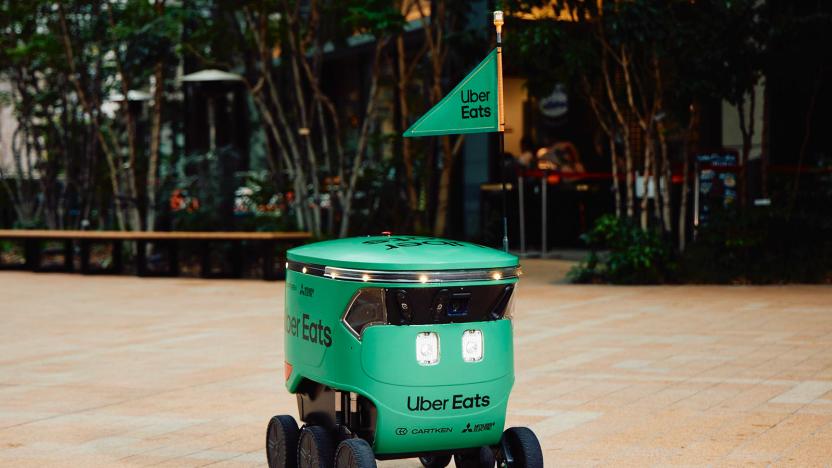
Uber Eats expands its autonomous food delivery service to Japan
Uber Eats will soon be offering autonomous food delivery service in Tokyo, Japan — its first outside the US.

Tokyo will require new housing projects to install solar panels starting in 2025
Many new homes built in Tokyo will require solar panels to be installed starting in April 2025.
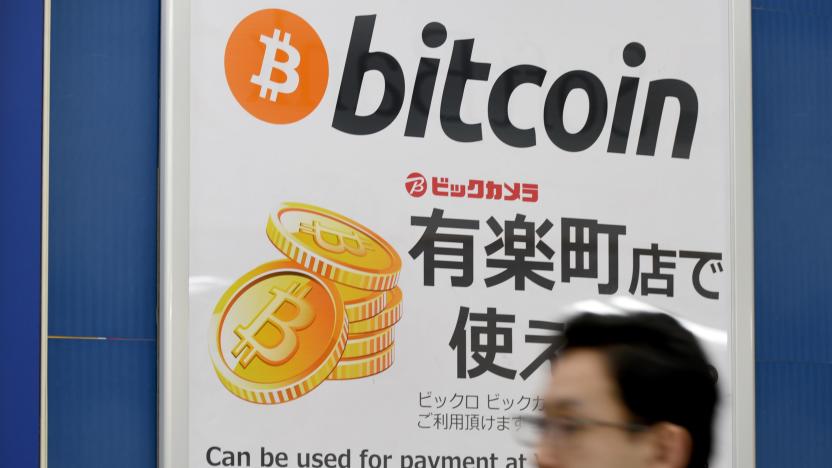
Hackers steal $97 million from Japan's Liquid crypto exchange
Hackers have stolen almost $100 million in cryptocurrency from digital wallets held by Japan's Liquid exchange.

Apple Maps' Street View-like feature expands to cities in Japan
So far, Apple Maps’ Street View-like Look Around feature has only been available in select cities in the US. However, it has now expanded internationally for the first time, coming to four cities in Japan: Tokyo, Osaka, Nagoya and Kyoto.

Uber is finally available in Tokyo as a taxi service
Uber is finally offering service in Tokyo, although you'll have to be content with taxis instead of ridesharing cars.
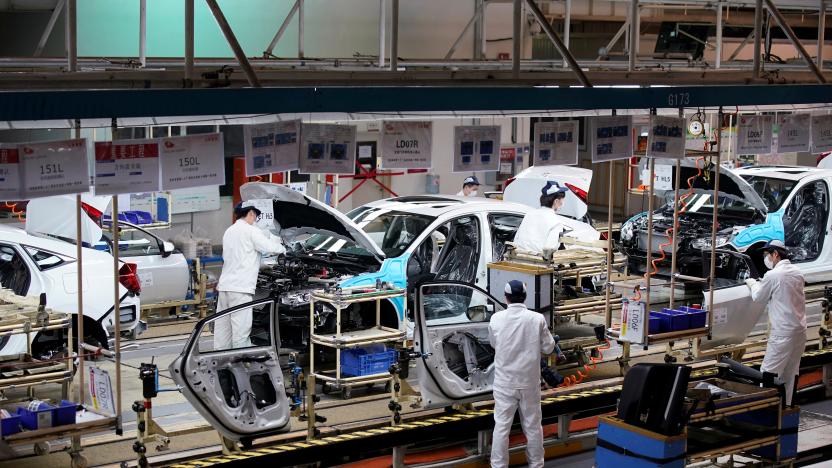
Cyberattack forces Honda to suspend global production for a day
Honda was forced to suspend global production for a day due to a cyberattack that infiltrated the company's internal servers in Tokyo.

The tech-laden Tokyo Olympics have been postponed
The International Olympic Committee (IOC) has finally accepted that the summer games in Tokyo can't go ahead. Shinzo Abe, Japan's prime minister, asked Thomas Bach, the president of the IOC, for a delay on the phone earlier today. The coronavirus pandemic meant it was simply impossible to ensure the safety of athletes, organizers and attendees during the event. "I proposed to postpone for about a year and president Bach responded with 100 percent agreement," Abe told reporters after the call. The games are now expected to take place in summer 2021, around the same time as the rescheduled Euro 2020 soccer tournament. Curiously, they will still be called the Olympic and Paralympic Games Tokyo 2020. "In the present circumstances and based on the information provided by the WHO today, the IOC President and the Prime Minister of Japan have concluded that the Games of the XXXII Olympiad in Tokyo must be rescheduled to a date beyond 2020 but not later than summer 2021, to safeguard the health of the athletes, everybody involved in the Olympic Games and the international community," the IOC said in a statement.

Japan's public broadcaster sets its 8K schedule for the Tokyo Olympics
The Tokyo Olympic and Paralympic games are still on schedule to take place this summer, and Japan's public broadcaster has been planning for years to make sure its an 8K showcase event. If you're in Japan, 8K broadcasts with 22.2 channel audio are available to home viewers, although it's a little less clear how the rest of us can catch it in the highest level of detail available. As far as the events available, NHK says it will have both the opening and closing ceremonies in 8K, including the first live broadcast at that resolution shot from a helicopter. Specific events will also be available in 8K, including track and field competition like the 100m and 200m men's finals, women's 200m finals and the men's 400m relay final. The women's soccer and volleyball finals will also be broadcast in 8K, along with selected events from badminton, judo, table tennis and swimming. A few weeks later in late August, the ceremonies for the Paralympics will also air in 8K, along with events like wheelchair rugby, swimming and track and field. Wherever 8K viewing is available it seems likely we'll get a similar set of things to watch, so stay tuned for any details from NBC or well-connected event spaces that can put a Super Hi-Vision broadcast on the big screen. I've seen an 8K broadcast from the 2012 Olympics in London streamed over Internet2, and it was a one-of-a-kind experience. In 2016 NBC streamed 4K video from Rio that was downconverted from NHK's 8K capture, but with 8K TVs on shelves and more bandwidth to go around maybe you'll get a chance to see it in your living room.
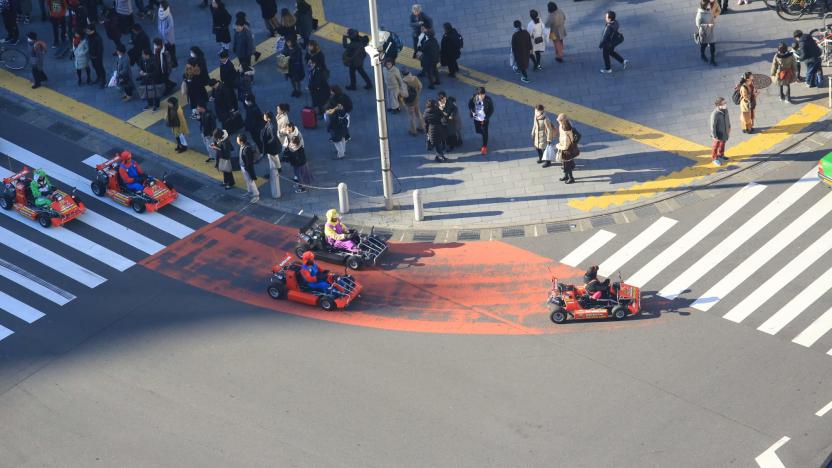
Nintendo wins legal battle against one of Tokyo's real-life 'Mario Kart' tours
Mario Kart-themed go-karts may soon disappear from the streets of Tokyo following a decisive legal win by Nintendo. On Wednesday, the gaming giant announced that Japan's Intellectual Property High Court had ordered Mari Mobility, one of the more popular go-kart operators in Tokyo, to pay a 50 million yen (approximately $458,000) fine for infringing on its IP rights

Toyota will offer rides in self-driving cars at the Tokyo Olympics
Toyota has revealed details of an upcoming public test for its level-4 automated vehicle and "Chauffeur" self-driving tech, and sports fans headed to Tokyo next year for the Olympic Games will have the chance to try it out. The automaker is offering rides in the car between July and September in the busy waterfront district of Odaiba.

'Mario and Sonic at the Olympic Games' will feature three 'Dream Events'
The Mario and Sonic series will feature three new "Dream Events" in its upcoming 2020 Tokyo edition. Nintendo offered a glimpse today at the three events in a trailer for the game, which will be released exclusively on Nintendo Switch this November. They include "Dream Shooting", "Dream Karate" and "Dream Racing".

Apple taps renowned artists for AR art walks
Apple has been pushing its way into the world of augmented reality for years. Now, it wants to get more users involved. Working with artists like Nick Cave, an American fabric sculptor and performance artist, Apple has installed AR art in public spaces in San Francisco, New York, London, Paris, Hong Kong and Tokyo. Users in those cities can sign up for a free Today at Apple experience called [AR]T. It involves an interactive walk to tour the AR installations, an in-store session that teaches the basics of creating AR using Swift Playgrounds and an AR installation in the store.

Twitter teams up with NBC for live 2020 Olympics coverage
NBC is slightly loosening its firm grasp on its Olympic Games broadcast rights. It's teaming up with Twitter to bring limited live coverage and highlights, along with a daily 20-minute Olympics show, to Twitter's website and apps during the Tokyo 2020 Games.
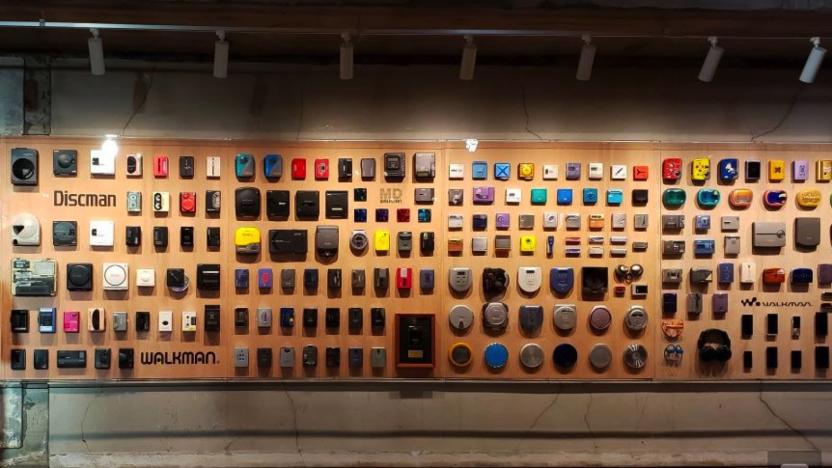
Sony's 230-Walkman exhibit celebrates 40 years of a music icon
To celebrate the 40th anniversary of the first Walkman sold (the TPS-L2, naturally), Sony is showing off the history of the portable music player in central Tokyo. It will run across the summer, through until September 1st, with writers and experts offering up interviews and talks on the iconic cassette (and CD) player series. Sony has assembled 230 different Walkmans laid out on a "Walkman Wall", and the whole thing shouldn't be hard to find -- a giant neon-yellow WM-F5 will lead the way.

Adults are the only ones who fell for the Momo hoax
Oh man, we really do live on the dumbest timeline. You probably recognize the horrifying visage you see above: it's Momo, the mascot for the internet's newest outrage sensation. The Momo Challenge, as it's called, reportedly encourages children and teens to commit increasingly brazen acts of self-harm and criminality. It's also a complete and utter, laughably obvious hoax. Your kids are fine, literally nobody on the entire internet has fallen for this -- except, well, countless adults, law enforcement agencies, news outlets and school districts. You know, the responsible folks. The Momo in the picture, it should be noted, is real. The figure is not digitally generated, nor is it photoshopped. "Momo" actually exists as a static sculpture, dubbed "Mother Bird," and was created by Japanese artist Keisuke Aisawa, who made it for his employer: the special effects company, Link Factory. It was first displayed in a Tokyo horror-art gallery back in 2016. View this post on Instagram 台風だから幽霊の絵見てきた 幽霊はいいぞ #幽霊画廊 #猫将軍 A post shared by さとう【生ビール嫌い】 (@j_s_rock) on Aug 22, 2016 at 7:13am PDT During its run at the gallery, visitors snapped pictures of the sculpture, officially titled "Mother Bird," and posted them to Instagram. Eventually the images made their way to Reddit's r/creepy forum where it was further disseminated across the internet, all the while morphing into the Momo Challenge. Momo made her first appearance in the mainstream early last year after authorities in Argentina warned of a "WhatsApp terror game" following the suicide of a 12-year-old girl. In the following months, the rumor of "El Momo" made waves in Mexico before eventually landing on news desks here in the US that fall. By that point, school officials and local police departments were claiming that Momo was being spliced into children's programming on YouTube and spread among WhatsApp users. The panic even spread to the UK at the start of 2019 before hopping the pond back to the United States late last month. At the end of February, a Twitter user going by Wanda Maximoff issued the following warning in a now-deleted tweet, The Atlantic reports, "Warning! Please read, this is real. There is a thing called 'Momo' that's instructing kids to kill themselves. INFORM EVERYONE YOU CAN." That tweet was viewed more than 22,000 times over the next few days before exploding onto the mainstream consciousness thanks to Kim Kardashian discussing the Challenge with her 129 million-odd Instagram followers. Yet despite there being no confirmed cases of kids and teens even participating in this activity -- much less dying from it -- adults and authority figures around the country have flipped out, rushing to protect children from an online menace that doesn't actually exist. What we have here is a full-blown moral panic. I wish I could tell you that moral panics were something new but, as Chris Ferguson, professor and co-chair of psychology at Florida's Stetson University, explains to Engadget, they've been around for millenia. "I mean, you can see narratives in Plato's dialogues where Athenians are talking about Greek plays -- that they're going to be morally corrupting, that they're going to cause delinquency in kids," Ferguson points out. "That's why Socrates was killed, right? Essentially, that his his ideas were going to corrupt the youth of Athens. Socrates was the Momo challenge of his day." Unfortunately, humanity appears to still be roughly as gullible as we were in the 5th century BC as new moral panics crop up with uncanny regularity. In recent decades we've seen panics about Dungeons and Dragons leading to Satanism, hidden messages in Beatles songs, killer forest clowns, the Blue Whale, the Knockout Game, and the Tide Pod Challenge. Despite the unique nature of threat presented in each panic, this phenomenon follows a pair of basic motifs, Ferguson explained. "There's this inherent protectiveness of kids," he said. "There's also the sense of like, kids are idiots and therefore adults have to step in and 'do something' -- hence the idea that your teenager can simply watch a YouTube video and then suddenly want to kill themselves. It's ridiculous if you think about if for 30 seconds but, nonetheless, this is an appealing sort of narrative." "There's the general sense of teens behaving badly and technology oftentimes being the culprit in some way or another," Ferguson continued. "It just seems that we're kind of wired, particularly as we get older, to be more and more suspicious of technology and popular culture." That is due, in part, because the popular culture right now isn't the popular culture that the people in power grew up with. It's a "kids today with their music and their hair" situation, Ferguson argues. He points out that "Mid-adult mammals tend to be the most dominant in social species," but as they age, their power erodes until they are forced out of their position by a younger, fitter rival. "As we get older, eventually we're going to become less and less relevant," he said. Faced with that prospect, older members of society may begin to view fresh ideas and new technologies as evidence of society's overall moral decline. kids: we're afraid of dying because of climate change boomers: that's ridiculous! we're afraid a Japanese half-woman half-bird sculpture is trying to kill you through the internet — Notorious Sexual Freak Mrs. Beverly Bighead (@mechapoetic) March 2, 2019 When presented with unfamiliar tech and notions, "we may have the sense that we're losing control of culture gradually," Ferguson speculates. "That makes [moral panicking] easy for us because of that anxiety to push back against anything new." Conversely, the motivations for people to commit these hoaxes is depressingly straightforward: it's fun being a jerk online. Trolling folks into believing that a nightmarish chicken lady is grooming your kids for suicide by targeting their Peppa Pig videos is done for a variety of reasons: simple amusement, as attention seeking behavior, or as an act of revenge. "I think sometimes people like to start these things because they want the reaction," Ferguson said. "They want to feel like they're smarter than all these knuckleheads," who fell for their ruse. Unfortunately, in today's social media landscape where attention serves as the de facto currency, simply ignoring the trolls -- hoping that they'll get bored and quit -- isn't likely to happen. And for as long as people keep reproducing, society will be faced with intergenerational strife as "the kids with their music and their hair" grow up, rightfully displace their elders and assert themselves as gatekeepers of the dominant culture. Even when faced with their own mortality and declining social influence, today's panic stricken adults do still have a quantum of solace: Aisawa announced earlier this week that, in the wake of the Momo Challenge fallout, he has destroyed the original sculpture. "It doesn't exist anymore, it was never meant to last," Aisawa told The Sun. "It was rotten and I threw it away. The children can be reassured Momo is dead – she doesn't exist and the curse is gone."

After Math: Hope for the Holidays
While Christmas decorations have already been festooned throughout big box retailers since the start of November, the holiday season is finally in full swing now that Thanksgiving is over. As such, industry and government both are gearing up to celebrate the reason for the season: capitalism.

Pager service in Japan is finally coming to an end
After nearly five decades, Japan is finally ending pagers for good. The last service provider in the country, Tokyo Telemessage, announced that it will terminate its service in September 2019, according to SoraNews24. The company said about 1,500 people still use pagers in its service area, which covers Tokyo and several neighboring regions.
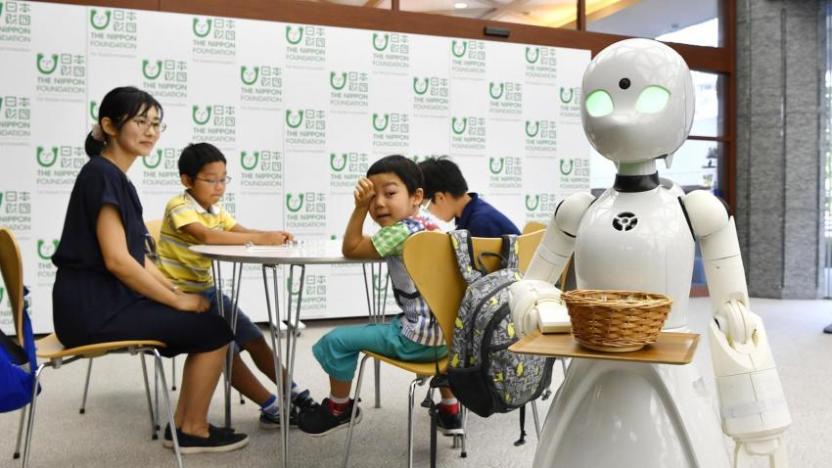
Tokyo cafe to use robot waiters operated by people with physical disabilities
Japan is taking steps to fight social isolation by employing robots in as many aspects of life as possible. After introducing autonomous robots in various roles in a hospital and a number of nursing homes and schools, a cafe in Tokyo will soon open with robotic waiters controlled remotely by people with physical disabilities who wouldn't be able to work otherwise.
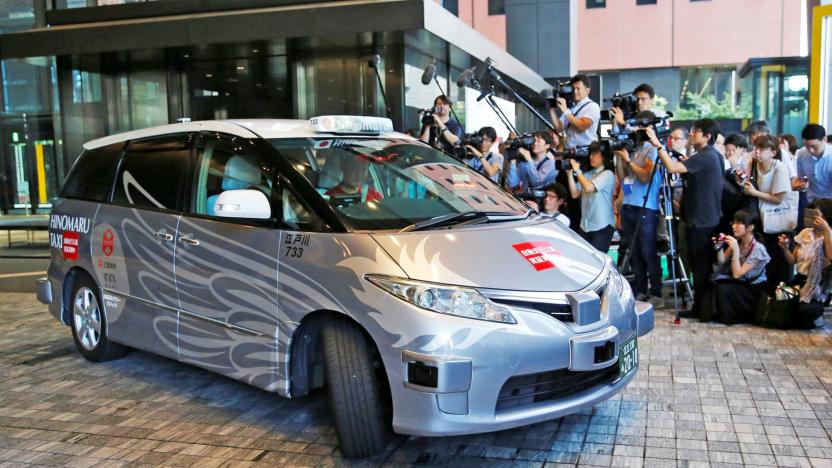
The race for self-driving taxis at the 2020 Olympics is heating up
Companies around the world are fervently vying for first place in the race to vehicular autonomy, and now it looks like one venture has crossed the finish line. A self-driving taxi has successfully taken passengers through the busy streets of Tokyo in a demonstration of what could be a fully-fledged service by the time the Olympic Games arrive in the city in 2020.
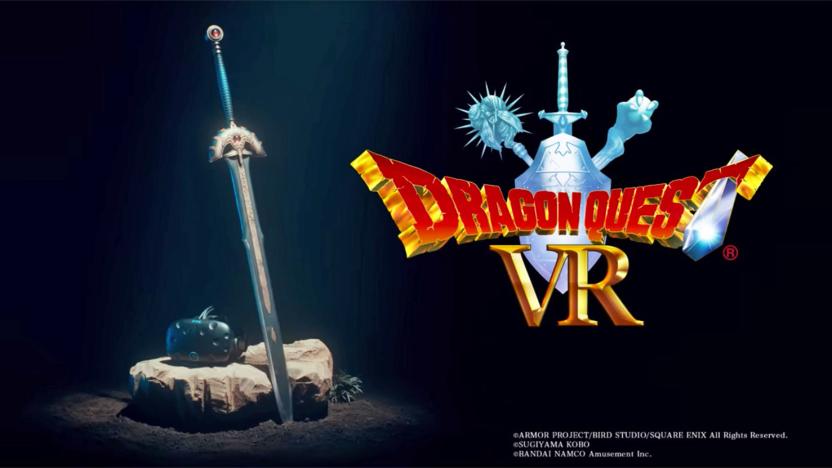
'Dragon Quest VR' brings giant virtual slimes to Japan's arcades
What do you mean you haven't ever played Dragon Quest? One of few JPRGs to have gone toe-to-toe with Final Fantasy and lived to tell the angsty tale, the series is still huge in Japan, even if the games have struggled to amass similar fanbases elsewhere. (Something that its Minecraft-esque spin-off has been trying to fix.)














